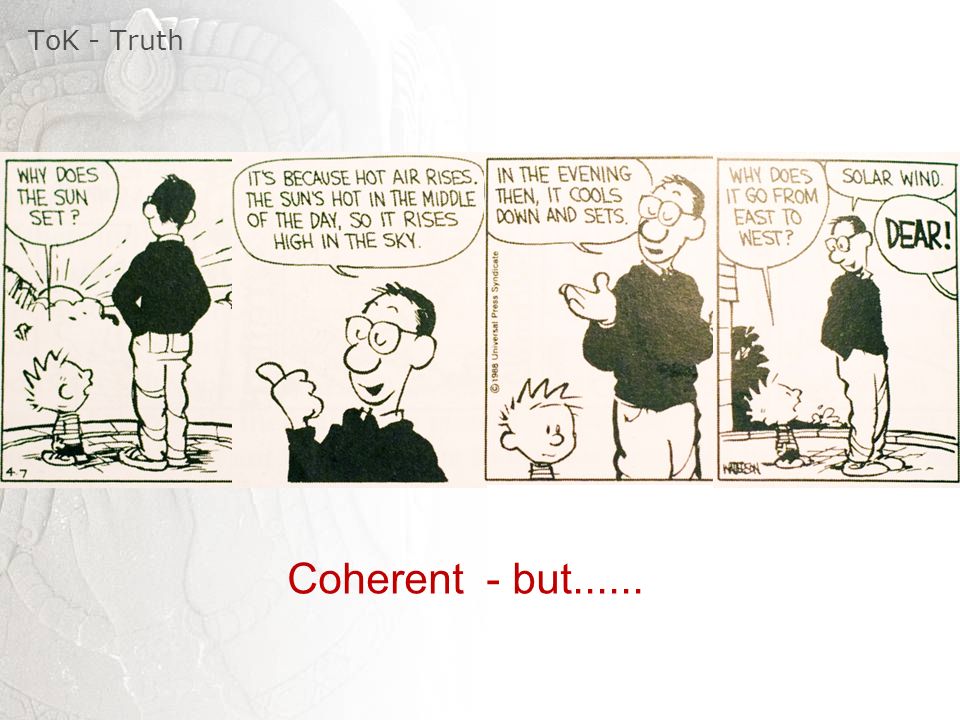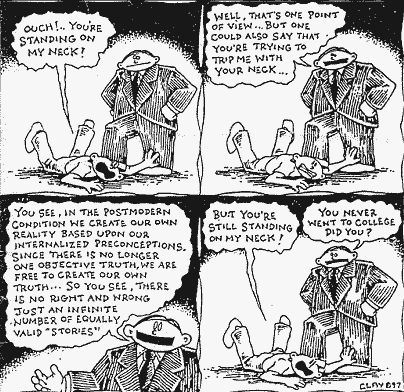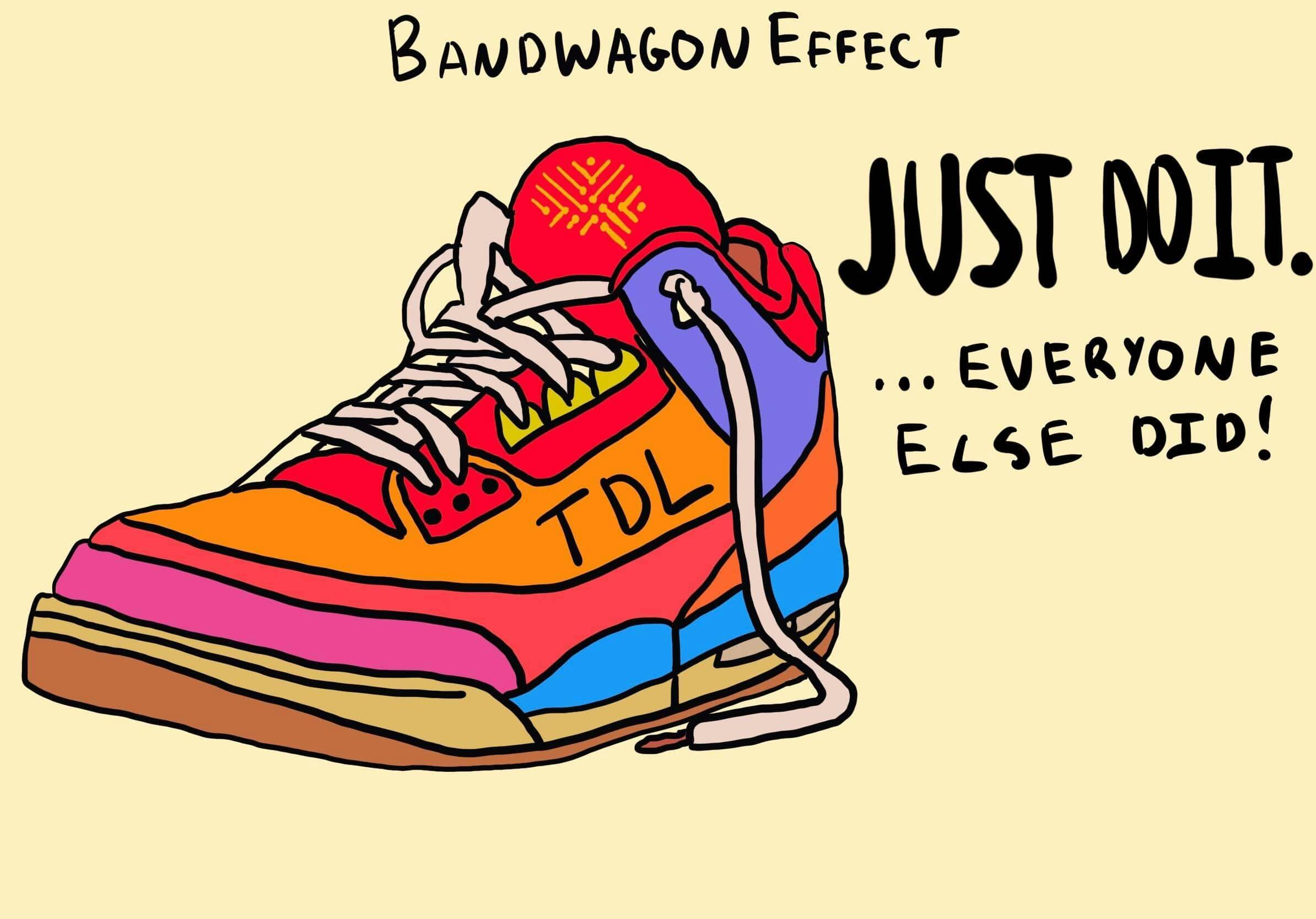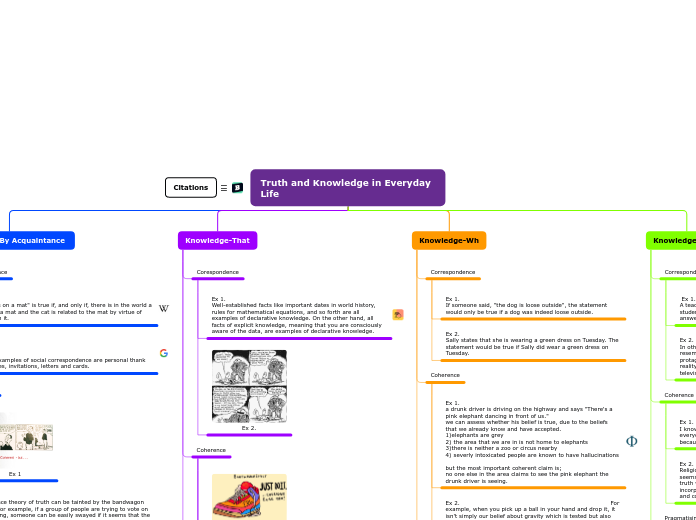Truth and Knowledge in Everyday Life
Knowledge By Acquaintance
Correspondence
Ex 1. "A cat is on a mat" is true if, and only if, there is in the world a cat and a mat and the cat is related to the mat by virtue of being on it.
Ex 2. Some examples of social correspondence are personal thank you notes, invitations, letters and cards.
Coherence

Ex 1
Ex 2. Coherence theory of truth can be tainted by the bandwagon effect. For example, if a group of people are trying to vote on something, someone can be easily swayed if it seems that the majority of the group is leaning one way.
Pragmatism
Ex 1. This article is about a woman who has never eaten fruit of vegetable. She says that the thought of eating them makes her sick. Her belief about these foods tasting bad is based purely on her thoughts and what she sees because she's never actually had a real interaction with them. The link is found right beside this thought bubble to read the full article.
Ex 2. A child could be afraid of the dark because they fear that there is a monster. It is only through direct interaction with the fear (sleeping without a nightlight) that the child will see there is no monster.
Knowledge-That
Corespondence
Ex 1. Well-established facts like important dates in world history, rules for mathematical equations, and so forth are all examples of declarative knowledge. On the other hand, all facts of explicit knowledge, meaning that you are consciously aware of the data, are examples of declarative knowledge.

Ex 2.
Coherence

Ex 1.
Ex 2. For example, when you pick up a ball in your hand and drop it, it isn't simply our belief about gravity which is tested but also our beliefs about a host of other things, not least of which would be the accuracy of our visual perception.
Ex 1.
a drunk driver is driving on the highway and says "There's a pink elephant dancing in front of us."
we can assess whether his belief is true, due to the beliefs that we already know and have accepted.
1)elephants are grey
2) the area that we are in is not home to elephants
3)there is neither a zoo or circus nearby
4) severly intoxicated people are known to have hallucinations
but the most important coherent claim is;
no one else in the area claims to see the pink elephant the drunk driver is seeing.
Pragmatisim
Ex 1. For example, in a pragmatic theory of truth, one has to specify both the object of the sign, and either its interpreter or another sign called the interpretant before one can say that the sign is true of its object to its interpreting agent or sign.
Ex 2. The statement is true if the statement has practical use in human life. For example, "it is important to keep up with personal hygiene by making sure to brush your teeth every night". This statement is true because it is something that everyone does, and dentists (professionals) recommend it so we do not get cavities.
Knowledge-Wh
Correspondence
Ex 1. If someone said, "the dog is loose outside", the statement would only be true if a dog was indeed loose outside.
Ex 2. Sally states that she is wearing a green dress on Tuesday. The statement would be true if Sally did wear a green dress on Tuesday.
Coherence
Ex 1.
a drunk driver is driving on the highway and says "There's a pink elephant dancing in front of us."
we can assess whether his belief is true, due to the beliefs that we already know and have accepted.
1)elephants are grey
2) the area that we are in is not home to elephants
3)there is neither a zoo or circus nearby
4) severly intoxicated people are known to have hallucinations
but the most important coherent claim is;
no one else in the area claims to see the pink elephant the drunk driver is seeing.
Ex 2. For example, when you pick up a ball in your hand and drop it, it isn't simply our belief about gravity which is tested but also our beliefs about a host of other things, not least of which would be the accuracy of our visual perception.
Pragmatisim
Ex 1. For example, Freud said that many people, in order to avoid despair, need to believe there is a god who keeps a watchful eye on everyone. According to one version of the Pragmatic Theory, that proposition is true. However, it may not be useful for other persons to believe that same proposition. They would be crushed if they believed that there is a god who keeps a watchful eye on everyone. Thus, by symmetry of argument, that proposition is false. In this way, the Pragmatic theory leads to a violation of the law of non-contradiction, say its critics.
Ex 2. One example of pragmatics in language would be if one person asked, "What do you want to eat?" and another responded, "Ice cream is good this time of year." The second person did not explicitly say what they wanted to eat, but their statement implies that they want to eat ice cream. This sort of implication falls under the category of pragmatics
Knowledge-How
Correspondence
Ex 1. A teacher, teaches a class how to use math formulas. If the students use the formula correctly, they should get the right answer.
Ex 2. In other words, a fact is true depending on how much it resembles reality. In the movie, "The Truman Show," the protagonist, Truman, initially believes that his life is based in reality despite the fact that he is actually living in a simulated television series.
Coherence
Ex 1. I know how to eat food. I know I can do this because I do it everyday. The same goes for talking. I learned this ability because it coheres with everybody else as well.
Ex 2. Religion. Originally developed by Hegel and Spinoza, it often seems to be an accurate description of how our conception of truth works. Put simply: a belief is true when we are able to incorporate it in an orderly and logical manner into a larger and complex system of beliefs.
Pragmatisim
Ex 1. This is an article on how to use a sewing machine. It takes you through a step by step tutorial. This can be an example of learning through interaction.
Ex 2. Another similar example would be taking a cooking class. You get hands on experience with tools and food in order to make something and then carry that knowledge with you so you can make that meal for dinner without any assistance.
